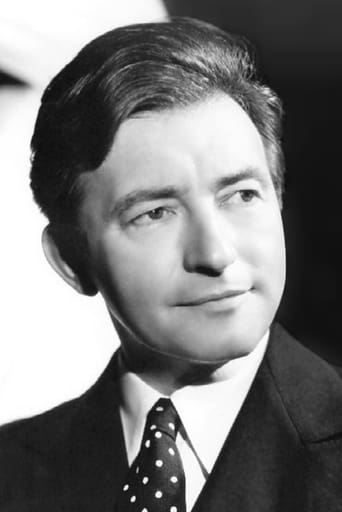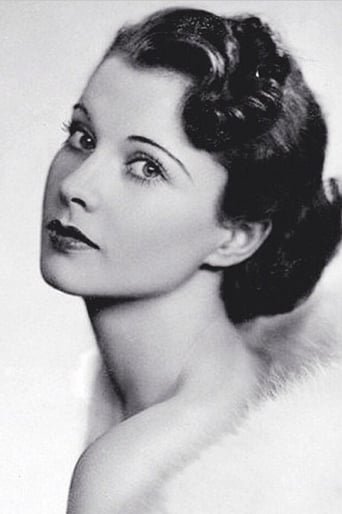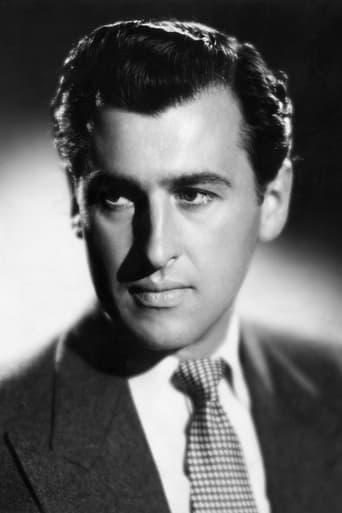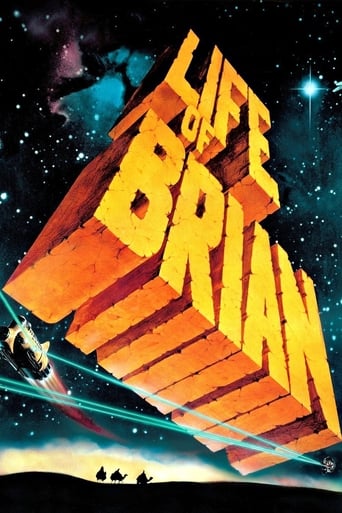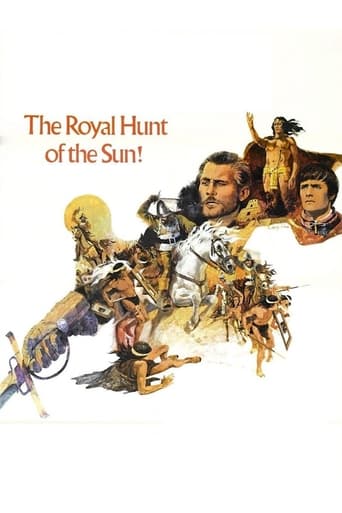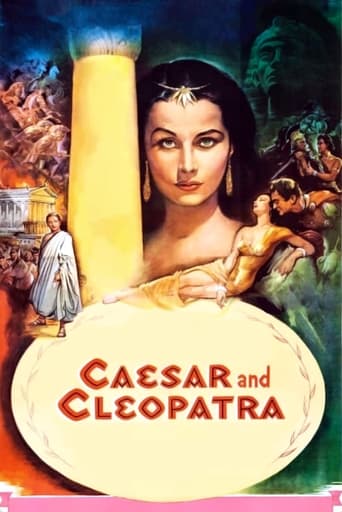
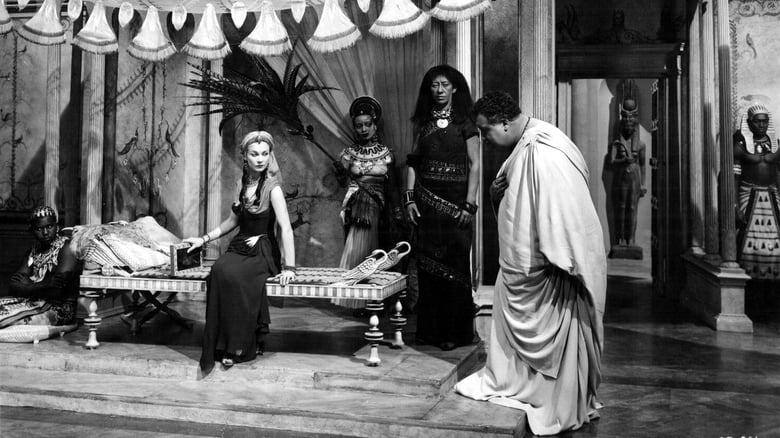
Caesar and Cleopatra (1946)
The aging Caesar finds himself intrigued by the young Egyptian queen. Adapted by George Bernard Shaw from his own play.
Watch Trailer
Cast
Similar titles


Reviews
Powerful
i must have seen a different film!!
Expected more
Don't listen to the Hype. It's awful
In advance of his relatively small Roman forces, the aging Julius Caesar (Claude Rains) is fresh from his victory over political rival Pompey. At the Sphinx he meets the unwary and naïve Cleopatra (Vivian Leigh, a decade older than Cleopatra was at the time). Although he playfully toys with her superstitious nature, he is never malicious. She acts like a frightened child, and does not even know how to command her slaves, especially Ftatateeta (Flora Robson). Caesar gives her a guiding hand on ruling her subjects. "Is it sweet or bitter to be a queen?" he asks. "Bitter" she replies. Soon the small Roman force (less than one legion) arrives and hails Caesar. "Don't eat me," she exclaims to him. He tells Cleopatra not to fear, as he is a reasonable man. Later, at the Egyptian court in Alexandria the capital, and surrounded by enemies, he speaks clearly but also in double entendres. Caesar does not reveal what he is thinking. Competing for the throne are sister (Cleopatra) and much younger brother Ptolemy (Anthony Harvey). As was the case in Egypt, brother and sister are also married (considered abhorrent by Romans). Ptolemy says that as soon as he is older, he will execute his older sister. Caesar's temporary decision is to have brother and sister jointly rule. He also says that he needs money, some 16,000 talents; he is told that the treasury is empty. At any rate, in such a treacherous atmosphere, one has to be on his/her toes. And it was really this way. Although Pompey had aided Egypt in his early campaigns, the Egyptians rewarded his request for sanctuary by murdering him before he was even ashore. An especially wicked court adviser is the eunuch Pothinus (Francis L. Sullivan). The scholar Theodotus (Ernest Thesiger) is treacherous. The Egyptian general, Achillas, is untrustworthy. All three were involved in the assassination of Pompey although the actual deed was done by Lucius Septimius (Raymond Lovell). Nevertheless, Caesar eventually allows the entire court to leave, an action that leaves his second-in-command Rufio (Basil Sydney) baffled. Michael Rennie is one of the Roman centurions. Young Stewart Granger plays a flamboyant Apollodorus, the Sicilian who helps deliver Cleopatra to Caesar. Britannus (Cecil Parker), from far away Britain that is not yet a Roman possession, is obviously in the script as an agent to give playwright Shaw a chance to get in some points for his homeland. The Romans manage to hang on to the palace grounds but are greatly outnumbered by Achillas' Egyptian army that has occupied most of Alexandria. At one point Caesar has to dive into the harbor and swim away to safety (historically accurate). In the fighting the fleet in Alexandria Harbor is set afire, which spreads to the famous library and destroys most of the old manuscripts. The scene where Cleopatra wraps herself in a carpet that is delivered safely to Caesar by Apollodorus is historically accurate also (although it happened earlier, and not later at the Pharos lighthouse). After the main Roman army in the East arrives they eventually defeat the Egyptians. Cleopatra, who has morphed from adolescent to a foxy manipulator, is now sole ruler of Egypt. As Caesar departs for Rome, he promises her that he will send one of his best generals, and one she has admired for a long time: Mark Antony.The film features terrific production values and costumes. The acting is great, as one would expect from such a production, and there is snappy and witty dialogue. Notice that in the opening credits, each of the U letters is converted to a letter V. Note that the Romans carved the letter V instead of U on marble, as V was used as U in Classical Latin. (Over time, usage changed.) Also, as it is difficult to carve smaller curves with a chisel, they were often avoided. So a letter C may appear as a sideways V (<). Postscript: The movie, produced on sound-stages, is based on Shaw's play, so it cannot be historical, although many pictured events did really happen. Cleopatra was educated and savvy enough to know her royal role, even before Caesar arrived. The film does not cover later incidents, such as the birth of Caesarion (the son of Caesar and Cleopatra), her trip to Rome, Caesar's rule, and his subsequent assassination. Caesar was never a murderous leader. Untraditional in his rule, he was wise and compassionate. Ironically, Caesar's benevolence and clemency – his forgiving of many enemies ("clementia") – led to his undoing. He left so many adversaries in the Roman Senate that they banded together and did their terrible deed on the Ides of March in 44 BC.
You're liable to get the impression from the first couple of scenes that this is stagy and maybe without too much point. Claude Raines as the newly arrived conqueror meets Vivien Leigh as the air-headed tittering adolescent Cleopatra in front of the Sphinx and under the Egyptian stars. It's all very cute.Well, it remains stagy. After all, it's a play. But it's hardly pointless. Raines remains the man he first appears, rather gentle, bearing the weight of the world on his shoulders, good-natured, able to suffer some twitting, stern but fair, endearingly sensitive about being middle aged and losing his hair.But Cleopatra -- wow! When she meets Raines, Vivien Leigh is wraith like and pale and imperiously beautiful without actually knowing it. At first, she's just a kid, jealous of her husband, who is her younger brother, who rules Egypt as Ptolemy -- or at least he did, until Raines takes the reins. But Leigh's character evolves. Her childishness, her giggling and choking on tears, is at first an aspect of her inner nature but later becomes a tactical ploy used deliberately in disarming enemies. She turns pretty clever, and not in a good way. Her whimsy turns to murder. She enchants Raines, but Raines is no fool. He treats her like a slightly reckless daughter until, after she has a rival assassinated, he dresses her down. But in the end he sails away, leaving her in the hands of his Executive Officer, and promising to send her a handsome younger man named Marc Antony.Aside from "Pygmalion," I was never able to get WITH George Bernard Shaw, whose play this is. The two or three of his plays that I've seen seemed preachy and discursive. But if you get past the opening, this one is pretty good. Of course, Shaw being the rational moralist he was, it's about more than Caesar and Cleopatra and who's going to rule Egypt.Cecil Parker is Caesar's worried slave and first-hand man, Brittanus, "an Islander," meaning he's from Britain and worships the Druids or something. Shaw has a good time with him, poking fun at his homeland. Well, I guess Shaw was Irish, but identified more with Britain. Parker's Brit is a mostly comic figure who can't swim. He's aghast when he is asked to leave Cleopatra with a man, unattended by a chaperon. "Shocked!", he exclaims, in a tone copyrighted by Claude Raines a few years earlier in "Casablanca." But then, later, someone asks Raines, "What, is Caesar in despair?" And Raines replies, "He who has never hoped cannot despair," which either Albert Camus ripped off from Shaw, or independently invented. Kids -- don't try to apply that maxim at home. I did, and it doesn't work.What a cast! Almost everybody who was anybody is in this thing in parts small or large. Stewart Granger is present as the tall, dark, handsome, Sicilian Apollodorus. He's the only person in the film with an evident sun tan and wardrobe has him decked out in embarrassingly brief garments. Stanley Holloway goes almost unnoticed as a Roman soldier with, I think, one line. (He was a sublime grave digger two years later in Olivier's "Hamlet.") Too many other familiar names to list, though I should mention that I think I glimpsed a chubby teen-aged Jean Simmons as a harp player who had no lines at all. If her movie career had stopped at this point, mine would have been better than hers. I had a dozen parts with no lines at all.All of those performances, by the way, are quite good, even if they seem a little hammy at times, as if this were a filmed play and the actors were trying for the balcony. The sets are both stylized and stylish.And it's both amusing and dramatic without being in the least preachy.
Impressive acting is the highlight of 1945's "Caesar and Cleopatra," a British production starring Vivien Leigh, Claude Rains, Stewart Granger, Flora Robson and Francis L. Sullivan. In smaller roles, you can spot Michael Rennie, Kay Kendall and Jean Simmons.This production was not without its problems - made during World War II, bombings often delayed the filming; there was a five-week break while Vivien Leigh recovered from a miscarriage; and there was a shortage of materials to build the sets. Nevertheless, for a British film, this is a real spectacle and made in color, which was also unusual back then.Shaw's Cleopatra (Leigh) is a childlike girl/woman who has hitting matches with her younger brother, runs, giggles, talks fast and becomes nervous at the thought of meeting the great Caesar (Rains). In the beginning, she meets him without realizing it. The two have a flirtation while he teaches her how to be a queen. Shaw's Caesar is an old man, a great warrior and a benevolent ruler who rules with a velvet glove rather than a sword.Rains and Leigh are wonderful in their roles. Rains, as someone stated, with his Caesar haircut, weary face and beautiful profile looks as if he stepped out of that time period. His mastery of Shaw's language is magnificent, and he really holds the film together.The stunningly beautiful Leigh, white-faced with glorious cheekbones and dazzling eyes, is a whimsical Cleopatra at first. She matures and becomes calmer and more regal as she learns how to be a queen, but she falls back into her childish ways in the presence of Caesar, particularly when he promises to send her Marc Anthony. They say the camera adds 10 pounds - frankly, I'm surprised any of the actors could see Leigh, she is so tiny. She gives a sprightly, energetic performance. Shaw's Cleopatra is 16 (though in reality she is 20 or 21) - Leigh was 32 at the time of filming and comes off like the teenager Shaw wrote.Stewart Granger as Apollodorus shows off his very hunky physique - no wonder he came to the attention of Hollywood. As two aides of Caesar's, Basil Sydney as Ruffio and Cecil Parker as Britanus give fine performances. Finally, Flora Robson as the protective, tough nursemaid of Cleopatra's, Ftatateeta, sinks her teeth into the role and is a force to contend with.This movie flopped, probably because audiences thought it was going to be some huge spectacle - it's big for England, but it's not DeMille. Still, it's a real treat to see one of the classics done by two great actors who were well-trained and well-equipped to perform George Bernard Shaw.
Although a great fan of Leigh as an actress, I did not care for her portrayal of Cleopatra as a spoiled, manipulative child who pouts and cries in order to get her way with old fuddy duddy Ceasar. This may indeed have made a witty stage play, but the movie was dull and lumbering. I kept going back to it hoping strongly it would get better, but to no avail. Not the least of it's irritating qualities for me was the total lack of historical accuracy. Cleopatra, though young, was acknowledged by contemporaries to be highly educated and intelligent, bred to rule and accustomed from birth to the political intrigues of her dynasty. She would not have needed Caesar to constantly prop her up and remind her to behave as a queen. I was sorry to see Leigh's talent wasted in this film. She is lovely to watch as always, and lights up the screen with her presence, and the acting of other cast members is likewise topnotch, but sadly none of that can save this dud.
